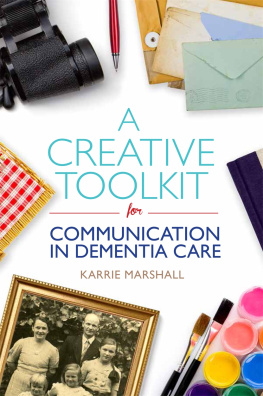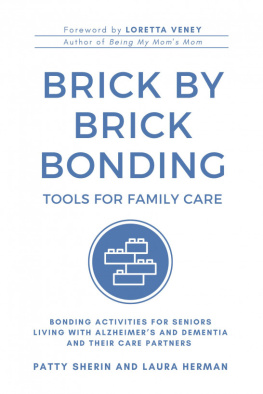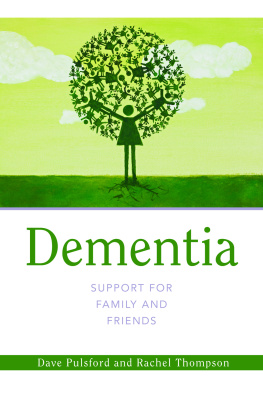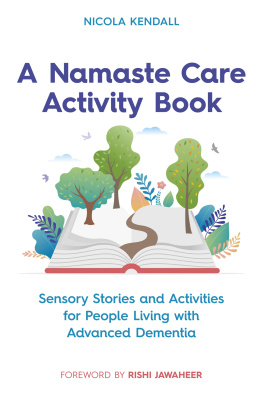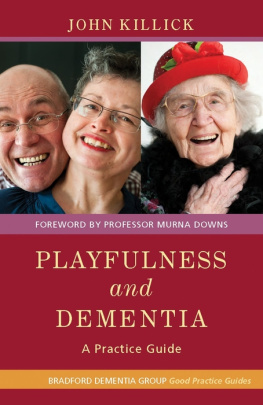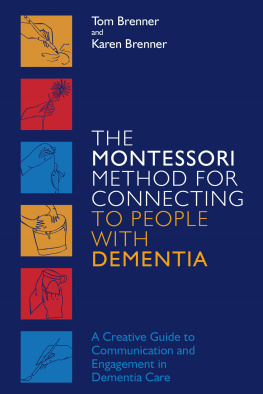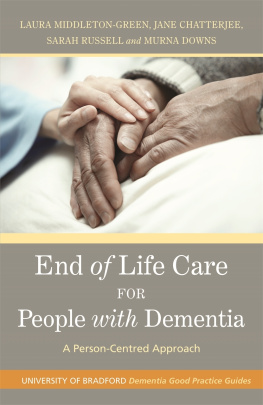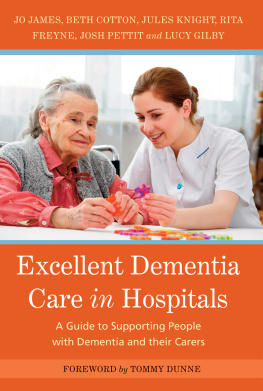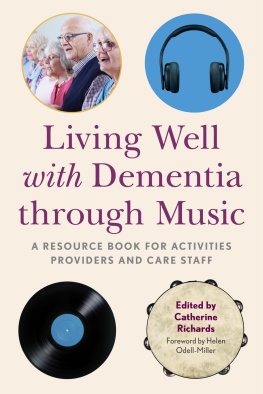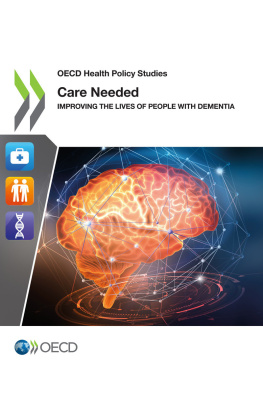
Each persons experience of dementia is unique. This book, based on many years of first-hand experience, will help us all to find our own unique way to use creative approaches in caring. It will be an invaluable resource to support and inform our work.
Keith Walker, Executive Director, Befrienders Highland Ltd
This book offers a different perspective in caring for those with dementia. Through a creative approach the author shows how it is possible to make connections and build relationships, with and without words. The process is described step-by-step, making it a valuable resource for anyone involved or interested in this field of work.
Julie Simmons, Adult Learning Strategy
Officer, High Life Highland, Inverness
by the same author
Puppetry in Dementia Care
Connecting through Creativity and Joy
Karrie Marshall
ISBN 978 1 84905 392 1
eISBN 978 0 85700 848 0
of related interest
Hearing the Person with Dementia
Person-Centred Approaches to Communication for Families and Caregivers
Bernie McCarthy
ISBN 978 1 84905 186 6
eISBN 978 0 85700 499 4
Facilitating Spiritual Reminiscence for People with Dementia
A Learning Guide
Elizabeth MacKinlay and Corinne Trevitt
ISBN 978 1 84905 573 4
eISBN 978 1 78450 018 4
Creativity and Communication in Persons with Dementia
A Practical Guide
John Killick and Claire Craig
ISBN 978 1 84905 113 2
eISBN 978 0 85700 301 0
Mindfulness for Carers
How to Manage the Demands of Caregiving
While Finding a Place for Yourself
Dr Cheryl Rezek
ISBN 978 1 84905 654 0
eISBN 978 1 78450 147 1
A CREATIVE TOOLKIT
FOR COMMUNICATION
IN DEMENTIA CARE
KARRIE MARSHALL

Jessica Kingsley Publishers
London and Philadelphia
Carl Sagan quote on p.84 reprinted with the permission of Little, Brown Book Group and Simon & Schuster, Inc. from Contact by Carl Sagan 1985.
First published in 2016
by Jessica Kingsley Publishers
73 Collier Street
London N1 9BE, UK
and
400 Market Street, Suite 400
Philadelphia, PA 19106, USA
www.jkp.com
Copyright Karrie Marshall 2016
All rights reserved. No part of this publication may be reproduced in any material form (including photocopying or storing it in any medium by electronic means and whether or not transiently or incidentally to some other use of this publication) without the written permission of the copyright owner except in accordance with the provisions of the Copyright, Designs and Patents Act 1988 or under the terms of a licence issued by the Copyright Licensing Agency Ltd, Saffron House, 610 Kirby Street, London EC1N 8TS. Applications for the copyright owners written permission to reproduce any part of this publication should be addressed to the publisher.
Warning: The doing of an unauthorised act in relation to a copyright work may result in both a civil claim for damages and criminal prosecution.
Library of Congress Cataloging in Publication Data
Marshall, Karrie, author.
A creative toolkit for communication in dementia care / Karrie Marshall.
p. ; cm.
Includes bibliographical references and index.
ISBN 978-1-84905-694-6 (alk. paper)
I. Title.
[DNLM: 1. Dementia--rehabilitation. 2. Communication. 3. Interpersonal Relations. WM 220]
RC521
616.83--dc23
2015027311
British Library Cataloguing in Publication Data
A CIP catalogue record for this book is available from the British Library
ISBN 978 1 84905 694 6
eISBN 978 1 78450 206 5
This book is dedicated to people who care for other people (for they are the students of love, mindfulness and creative communication), and to people diagnosed with dementia (for they are the teachers).
CONTENTS
INTRODUCTION
How do we best support a persons identity, relationships and emotional wellbeing through changes that occur as a result of brain disease, such as dementia?
Sometimes relatives and care staff reach a point where they are uncertain about how best to communicate or support someone; but with the support and tools shown here people find there are many ways. Communication is always possible.
This book contains tried and tested creative activities to support people to be themselves through a wide range of experiences. It is a toolkit for creative communication using step-by-step methods for interacting and making connections, with and without words.
For more than ten years the work was developed with people living with dementia; finding out what people prefer; learning what works best and why. The activities and approaches found here have received tremendously positive feedback.
As the disease progresses, the usual channels of communication can alter, leading to confusion, misunderstandings or upset. By using alternative means to exchange ideas or express feelings, people continue to have positive and meaningful interactions with each other.
Relationships may change as dementia progresses. This can be a difficult process for families and friends who rely on shared memories or clear roles and expectations of each other. Changes in recognition and communication also affect staff who build trust with the person they care for. But we can find new ways to be in relationships and spend quality time together without having to rely on words or memory. Every activity here can help with that process of adjustment.
Creativity helps to form a meeting space. It adds a dimension to our engagement with each other that feels comfortable, and aids better communication. This becomes paramount when supporting someone who seems lost, anxious and confused.
Our brains are creative organs, constantly making neural connections, interpreting, processing and responding to stimuli. Different forms of dementia affect different parts of the brain, but we know from experience and from academic research that as peoples brains change, creative aspects remain. It is through creative connections that we can support identities, relationships, self-expression, emotional wellbeing, independence and end-of life-care.
There are effective principles to learn along the way. Each chapter highlights a particular benefit that people living with dementia, family carers and staff identify as important. Tips, activities and approaches are shown to support benefits such as identity, memory, self-expression, relationships, emotional and spiritual wellbeing and peace. This promotes greater confidence in caring.
Attitudes towards living with dementia seem to be improving. There is wider acceptance that life can continue to be meaningful after diagnosis. We are more aware of the value of creative approaches to dementia care. There is greater focus on leading healthy lifestyles (for example, to reduce the risks of stroke that can cause vascular dementia) by reducing cholesterol, maintaining healthy weight, blood pressure and fitness, stopping smoking, reducing alcohol intake and exercising more.
It is important to be clear that dementia is not an inevitable outcome of older age. Most people do not get dementia, and people who do get diagnosed are not necessarily doomed to suffer. There are many ways to experience the disease. People can live well for several years, even through changes.
Whilst people speak about dementia as one thing, it is a collective term for different forms of brain disease causing a variety of symptoms, such as loss of concentration, confusion, loss of words, memory problems, deep suspicions, or changes in behaviour. Not every person experiences every symptom.
Next page
